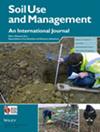Effects of poly‐γ‐glutamic acid on soil structure and water retention characteristics under dry‐wet cycles
IF 3.7
3区 农林科学
Q1 SOIL SCIENCE
引用次数: 0
Abstract
Poly‐γ‐glutamic acid (γ‐PGA) has been demonstrated to exhibit a soil water retention effect; however, the agricultural irrigation practices induce a cyclic pattern of wetting and drying in the soil, and its synergistic interaction with γ‐PGA remains unclear. To explore the amendment effects of γ‐PGA on pores structure, aggregates distribution, and soil water retention characteristics under dry‐wet cycles, an experiment was established with the number of dry‐wet cycles (0, 2, 4, and 8 times; a single dry‐wet cycle involved reducing soil water content from 80% to 40% of field water capacity) and γ‐PGA addition rates (0%, 4%, and 8%, represented by P0, P4, and P8, respectively). The results indicated that γ‐PGA enhanced the structure of soil pores and distribution of aggregates; especially, P8 exhibited a remarkable increase in pore number by 91.68% and mean weight diameter of aggregates by 17.17%, compared to P0. Additionally, the soil enhanced by γ‐PGA exhibited higher water retention capacity, with P4 and P8 showing average increases of 4.26% and 12.58% in saturated water content compared to P0. Notably, the effect of γ‐PGA on pores structure, aggregates distribution, and water retention characteristics was regulated by dry‐wet cycles. The γ‐PGA had the most significant improvement effect on soil structure under 8 times dry‐wet cycles, the optimal development on water retention characteristics under four times dry‐wet cycles. Therefore, these findings suggest that the optimal approach to enhance soil structure and water retention capacity is by incorporating γ‐PGA at a concentration of 0.8% in conjunction with 4–8 dry‐wet cycles.聚γ-谷氨酸对干湿循环条件下土壤结构和保水特性的影响
聚γ-谷氨酸(γ-PGA)已被证实具有土壤保水作用;然而,农业灌溉会引起土壤干湿循环,其与γ-PGA的协同作用尚不清楚。为了探索γ-PGA 在干湿循环条件下对孔隙结构、团聚体分布和土壤保水特性的修正作用,实验设置了干湿循环次数(0、2、4 和 8 次;单次干湿循环包括将土壤含水量从田间持水量的 80% 降至 40%)和γ-PGA 添加率(0%、4% 和 8%,分别表示为 P0、P4 和 P8)。结果表明,与 P0 相比,γ-PGA 增强了土壤孔隙结构和团聚体的分布,尤其是 P8 的孔隙数显著增加了 91.68%,团聚体的平均重量直径增加了 17.17%。此外,γ-PGA 增强的土壤显示出更高的保水能力,与 P0 相比,P4 和 P8 的饱和含水量分别平均增加了 4.26% 和 12.58%。值得注意的是,γ-PGA 对孔隙结构、聚集体分布和保水特性的影响受干湿循环的调节。在 8 次干湿循环下,γ-PGA 对土壤结构的改善效果最显著;在 4 次干湿循环下,γ-PGA 对保水特性的影响达到最佳。因此,这些研究结果表明,提高土壤结构和保水能力的最佳方法是在 4-8 次干湿循环中加入浓度为 0.8% 的 γ-PGA。
本文章由计算机程序翻译,如有差异,请以英文原文为准。
求助全文
约1分钟内获得全文
求助全文
来源期刊

Soil Use and Management
农林科学-土壤科学
CiteScore
7.70
自引率
13.20%
发文量
78
审稿时长
3 months
期刊介绍:
Soil Use and Management publishes in soil science, earth and environmental science, agricultural science, and engineering fields. The submitted papers should consider the underlying mechanisms governing the natural and anthropogenic processes which affect soil systems, and should inform policy makers and/or practitioners on the sustainable use and management of soil resources. Interdisciplinary studies, e.g. linking soil with climate change, biodiversity, global health, and the UN’s sustainable development goals, with strong novelty, wide implications, and unexpected outcomes are welcomed.
 求助内容:
求助内容: 应助结果提醒方式:
应助结果提醒方式:


